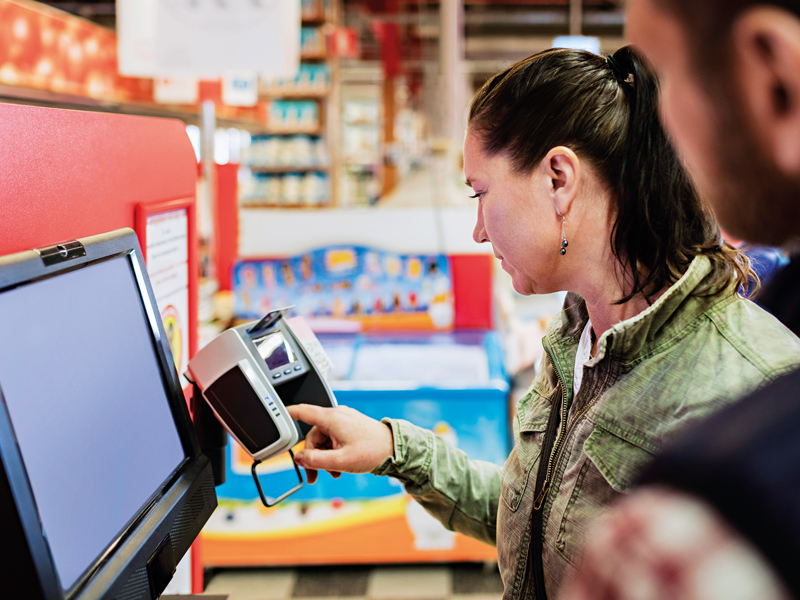Technological developments are making retail cashiers obsolete
As Amazon launches more unmanned stores and self-service technology develops, human cashiers could soon find themselves out of a job

The rise of the self-checkout will inevitably result in job losses. In the US, retail jobs are the most common type of employment, with women holding more than 70 percent of the positions
In recent years, the retail industry has seen a dramatic decrease in the number of cashiers present in stores, with self-service checkouts filling their positions instead. Many of us bemoan the automated machines; the thought of locating oft-hidden barcodes, scanning at exactly the right angle and packing all at the same time just seems like too much. Then there are the frequent issues that arise, which see customers patiently waiting for a human employee to come to their assistance, type in a secret code or attest to the fact that they are old enough to purchase cough medicine.
A large portion of the workforce – not just in the US and China, but across the globe – could become redundant as a result of our incessant pursuit of convenience
The idea of these DIY checkouts is to improve efficiency and convenience for customers, but how effective are they? They may work when you’ve only got a handful of items, but anything more seems to send the whole system into meltdown. Despite these frustrations, self-service checkouts continue to make their way into shops – and as the technology develops, these teething problems may soon be a thing of the past. It seems that we may be set to say goodbye to supermarket cashiers forever.
Grab and go
In December 2016, e-commerce behemoth Amazon launched Amazon Go, its first cashier-less grocery store, selling ready meals prepared onsite, basic groceries, drinks and snacks. To date, it has 10 stores in Seattle, Chicago and San Francisco, with number 11 on its way; rumours of a London branch have been circulating since last year.
Using sensor fusion, deep learning, computer vision and hundreds of cameras, Amazon’s ‘just walk out’ technology automatically identifies when items are taken off shelves (and returned, for that matter). It keeps track of everything in a virtual basket and when customers are done, they simply walk out. An e-receipt of the charge to their Amazon account follows soon after. While many supermarkets are dipping their toes into the self-checkout game, Amazon Go stores signal a landmark moment for the retail landscape.
In China, though the technology is less advanced than Amazon’s, the number of cashier-less shops is in the hundreds and continues to soar thanks to dozens of start-ups in this burgeoning market. One prominent player is BingoBox, which features radio-frequency identification (RFID) tags on all its products. To check out, shoppers scan their items using a typical self-checkout machine and pay via multi-purpose app WeChat.
China’s biggest players – Alibaba, JD.com and Tencent – are also jumping on the bandwagon. With more than 20 stores already in operation, e-commerce giant JD.com has plans to roll out hundreds more using increasingly sophisticated technology, such as facial recognition. In August 2018, meanwhile, JD.com opened its first unmanned store in Indonesia, signalling its plans for regional expansion.
They took our jobs
The rise of the self-checkout will inevitably result in job losses. In the US, retail jobs are the most common type of employment, with women holding more than 70 percent of the positions. According to a recent report by Cornerstone Capital Group, in the coming years we can expect to see a loss of between six and 7.5 million retail jobs in the US alone as a result of automation. A large portion of the workforce – not just in the US and China, but across the globe – could become redundant as a result of our incessant pursuit of convenience. A number of companies, including Amazon, have guaranteed that technological developments would not see cashiers replaced with machines, but let’s not forget that banks made – and broke – similar promises when they first introduced ATMs many years ago.
There’s also something to be said for the human contact we receive when grocery shopping. For some, it may be the only social interaction they have for days and, as such, is a welcome breath of fresh air. In today’s fast-paced, technologically driven world, individuals are becoming increasingly isolated. Let’s not march even more rapidly towards that future – there is a place for convenience, but not at the cost of millions of jobs and one of the last bastions of social interaction.













